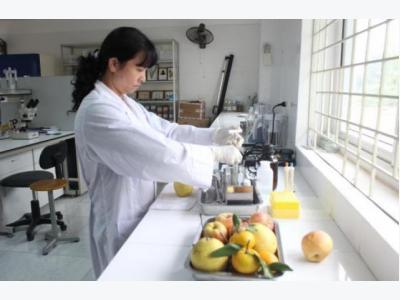Agricultural enterprises actively participate in National Single Window

Officially joined from June 2015, so far MARD has had 9 administrative procedures applied to NSW, which brings lots of advantages for enterprises as well as State administrative authorities. Currently agricultural enterprises are trying to improve techniques for implementation of NSW procedures.
The implementation of procedures for granting certificates of import, transit and immigration phytosanitary would help enterprises save a lot of costs. Photo: T.Binh
Three-party accompany
MARD has 7 units of which there are 5 Departments (Livestock, Animal Health, Plant Protection, Horticulture, Agriculture, Forestry and Fisheries Quality Management) and 2 General Departments (Fisheries and Forestry) involved in the NSW deployment. In the process of piloting the NSW, MARD has been in good collaboration with the General Department of Customs, Viettel Group and other related units. MARD is striving in 2017, to implement administrative procedures related to export, import, temporary import for re-export, temporary export for re-import and transit of agricultural products managed by the Ministry, using NSW.
Implementing Planning of expanding NSW at the Plant Protection Department (MARD) from 1 January 2017, the procedures for granting "certificates of import, transit and domestic transport phytosanitary" has been implemented in four surveyed units including: Quarantine Region I Branch (HaiPhong), Quarantine Region II Branch (HCMC), Quarantine Region V Branch(Hanoi) and Quarantine Region VIII Branch (Lao Cai).
Previously, for good implementation, Plant Protection Department has promoted to organizations and individuals that import and export objects to plant quarantine at Noi Bai International Airportborder gate deployed the granting of "Certificates of import, transit and domestic transportation phytosanitary”, transferring from paper documents to electronic records. At the same time, the Department will also review legal documents and work processes related to export and import phytosanitary to reduce time, costs and ensure openness and transparency.
Fixing obstacles quickly
Through the implementation, the Plant Protection Department said that the deployment of NSW has contributed to shorten time, reduce costs (saving time going to the Quarantine authorities to submit registrations, andtransferring the results to the Customs authority) for organizations and individuals; simultaneously, ensuring openness, transparency and enhancing the effectiveness and efficiency of State management.
Also according to the Plant Protection Department, during the deployment of granting "Certificate of import, transit and domestic transportation phytosanitary" through NSW, a lot of difficulties needed to be solved. For example, at the beginning, the shift of granting paper documents procedure to electronic records made a number of organizations and individuals not adapt quickly enough to the application of information technology. To organizations and individuals importing few objects of phytosanitary (import once) would have difficulty in implementing the procedures on the NSW. Not only small enterprises with few import, export procedures, but even large-scale enterprises, implement procedures quite often are also afraid to change because they are too familiar with the traditional way with paper records.
The Plant Protection Department is also concerned about the legality of the documents due to the enterprises’ documents in the system are all scanned, processing software has not had statistical, reports, and synthesised functions; the exchange, providing informationfunctions on the system can only provide one-way communication from Quarantine authority to Customs authority, has not had the reverse exchange functions. Especially, the software was not completed as expected,some procedures are stillstored aspaper records, so both ways are in use: Solving recordsonline and issuing hard copies for enterprises.
Talking to Customs News reporters about the difficulties related to the implementation of procedures for issuance of the "Certificate of import, transit and domestic transportation phytosanitary" through the NSW, Mr. Pham QuangHai- Casa fishery exporting and processing services JSC said, although being new to the deployment the enterprisehad got a lot of support from the Customs authorities in electronic records declaration. Saving a lot of time and costs when participating in NSW. However, I also wish the software would be quickly completed, and synchronized between ministries.
And according to Ms. Huynh My Xoa - Quality Management Division –LinhTrang Processing and Exporting Ltd. said, the company only imports average of 1-2 containers per month,therefore using documents through NSW has not been a priority, the company also has sent staff to try to register the account and digital signatures for documents declared on the NSW, but since not knowing well the process, and also thinking it is complicated, the company has not yet deployed.
Although MARD, Plant Protection Department had organized many training courses for enterprises, the majority opinions are that the system is still inconvenient and cumbersome. Mr. Vo Tan Loi, export - import employees of Nhan Anh Agricultural Import and Export Co., Ltd. said, after logging into the account, in order to keep declaring the record, companies must select the correct logo of MARD on the home view of the NSW, lots records with attached files, or in the excel format are also having difficulties.
However, representatives of companies also admitted that the implementation of procedures through NSW is a lot faster than the old ways, especially for enterprises in distant provinces, most of the companies said that they will consider using NSW in the near future.
Có thể bạn quan tâm
 TH Group kicks off construction of new major hi-tech agricultural project
TH Group kicks off construction of new major hi-tech agricultural project Locally-owned TH Group, famous for its TH true MILK brand, has officially added to its hi-tech agricultural investment portfolio by a new US$136.4 million
 Vegetable, fruit exports to struggle
Vegetable, fruit exports to struggle The domestic vegetable and fruit industry will face obstacles in maintaining sustainable growth in export value at the current high level
 Vietnamese chicken breast to be exported to Japan
Vietnamese chicken breast to be exported to Japan Processed products from chicken breast raised in the southern province of Dong Nai will be exported to the Japanese market for the first time this July